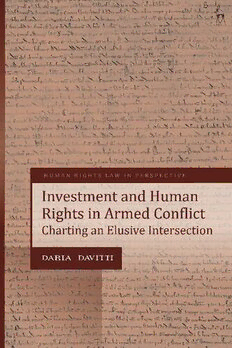
Investment and Human Rights in Armed Conflict: Charting an Elusive Intersection PDF
287 Pages·2019·6.396 MB·English
Most books are stored in the elastic cloud where traffic is expensive. For this reason, we have a limit on daily download.
Preview Investment and Human Rights in Armed Conflict: Charting an Elusive Intersection
Description:
This book analyses the way in which international human rights law (IHRL) and international investment law (IIL) are deployed – or fail to be deployed – in conflict countries within the context of natural resources extraction. It specifically analyses the way in which IIL protections impact on the parallel protection of economic, social and cultural rights (ESC rights) in the host state, especially the right to water. Arguing that current responses have been unsatisfactory, it critically considers the emergence of the ‘Protect, Respect and Remedy’ framework and the Guiding Principles for Business and Human Rights (jointly the Framework) as a possible analytical instrument. In so doing, it examines the strengths and weaknesses of attempts at ‘recalibrating’ IIL through the Framework, and then investigates the implications of this recalibration for the IHRL-IIL interplay in a host country involved in a protracted armed conflict: Afghanistan. Through the emblematic example of Afghanistan, the book presents a practical dimension to its legal analysis. It uniquely portrays the elusive intersection between these two bodies of international law within a host country where the armed conflict continues to rage and a full economic restructuring is taking place away from the public eye, not least through the deployment of IIL and the inaction – or merely partial consideration – of IHRL. The book will be of interest to academics, policy-makers and practitioners of international organisations involved in IHRL, IIL and/or deployed in contexts of armed conflict.Volume 23: Human Rights Law in Perspective
See more
The list of books you might like
Most books are stored in the elastic cloud where traffic is expensive. For this reason, we have a limit on daily download.
